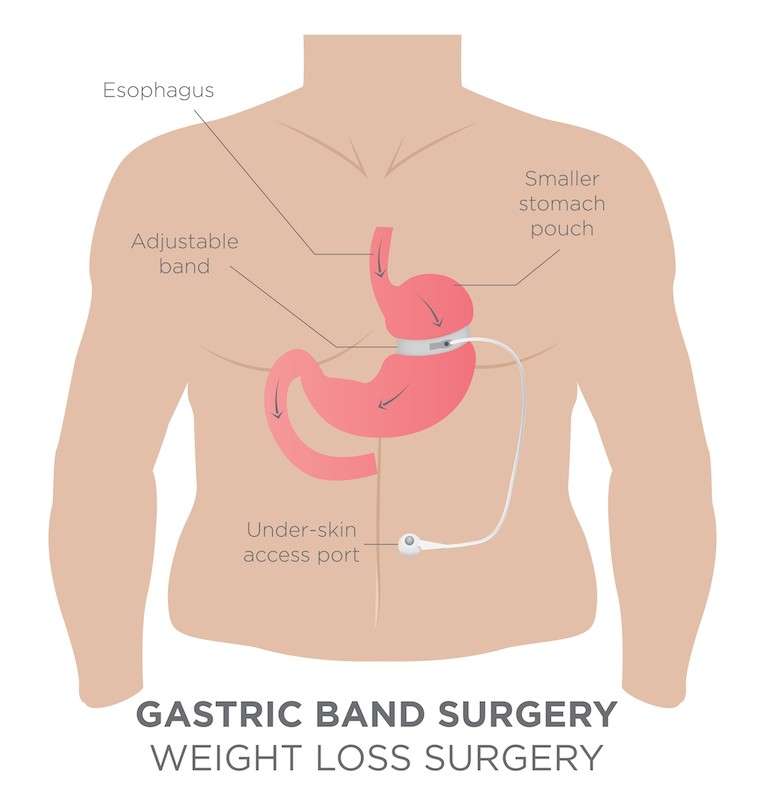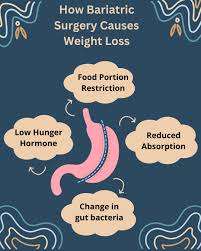When it comes to combating obesity, bariatric surgery has emerged as a powerful tool for achieving significant and sustained weight loss.
But how exactly does it work, and why is it so effective?
In this article, LeanAndFit research staff shall explore the mechanisms, timeline, and real-life impact of bariatric surgery on rapid weight loss.
We would also address common questions, backed by scientific studies, to give you a comprehensive understanding of how bariatric surgery transforms lives.
In This Article:
- Introduction to Bariatric Surgery and Weight Loss
- Mechanisms of Rapid Weight Loss Post-Surgery
- Restriction and Malabsorption
- Hormonal Changes
- The Bariatric Surgery Weight Loss Timeline
- Real-Life Example: Emily’s Weight Loss Journey
- Common Challenges: Weight Loss Plateau and How to Overcome It
- Long-Term Benefits: Beyond Weight Loss
- Scientific Insights: Studies Supporting Bariatric Surgery
Introduction to Bariatric Surgery and Weight Loss
Bariatric surgery refers to a group of medical procedures aimed at assisting individuals with severe obesity in achieving substantial weight loss.
Common types include gastric sleeve, gastric bypass, and adjustable gastric bands. These surgeries primarily function by altering the digestive system to limit food intake and nutrient absorption.
Beyond mechanical restriction, bariatric surgery significantly influences hormones such as ghrelin (the hunger hormone) and insulin, creating metabolic changes that promote long-term weight loss.
For instance, gastric sleeve surgery reduces the stomach’s size, making patients feel full faster, while gastric bypass reroutes the digestive tract, reducing calorie absorption.
These combined effects lead to rapid weight loss and improved metabolic health, particularly in conditions like type 2 diabetes and hypertension.
To truly grasp how bariatric surgery promotes such profound changes, it is essential to explore its mechanisms, weight loss timeline, and the physiological transformations it triggers.
This article delves into the science behind these life-altering procedures.

Mechanisms of Rapid Weight Loss Post-Surgery
Bariatric surgery works on multiple levels to promote significant and rapid weight loss.
Let’s break it down:
Restriction and Malabsorption:
One of the primary mechanisms of bariatric surgery is restriction. Procedures like gastric sleeve surgery involve reducing the stomach’s size to a small, banana-shaped pouch.
This reduction limits food intake, making patients feel full after consuming much smaller portions.
For example, patients often wonder, “How much weight do you lose immediately after gastric sleeve?”
The answer is typically 5–15 pounds in the first two weeks, largely due to calorie restriction and initial water loss.
In gastric bypass surgery, malabsorption is an additional factor. This procedure reroutes a portion of the digestive system, bypassing parts of the stomach and small intestine.
As a result, the body absorbs fewer calories and nutrients, significantly accelerating weight loss. The combination of restriction and malabsorption creates a potent weight-loss effect.
Hormonal Changes:
Bariatric surgery also triggers profound hormonal shifts.
The production of ghrelin, the “hunger hormone,” decreases significantly after procedures like gastric sleeve and bypass, leading to reduced appetite.
Simultaneously, hormones that enhance insulin sensitivity, such as GLP-1, increase.
This hormonal balance not only aids weight loss but also improves blood sugar control, benefiting patients with type 2 diabetes.
A study in The New England Journal of Medicine emphasizes that these hormonal changes are a key reason why bariatric surgery leads to sustained weight loss and better overall metabolic health.
The Bariatric Surgery Weight Loss Timeline
Weight loss after bariatric surgery follows a distinct pattern.
- Immediate Weight Loss (First Few Weeks): Patients often see a rapid drop in weight due to reduced calorie intake and initial fluid loss.
- Steady Loss (Months 1-6): This is the most significant phase, where the majority of the weight loss occurs. Many patients report losing 30-50% of their excess weight during this period.
- Slowing Down (Months 7-12): While still losing weight, the pace slows as the body adjusts. Here’s where the “bariatric surgery weight loss calculator” becomes useful for setting realistic expectations.
- Maintenance Phase (1 Year and Beyond): After the first year, weight loss typically plateaus, but the long-term durability of weight loss is often maintained through lifestyle changes.
Emily’s Journey: From Gastric Sleeve to Transformation
Emily, a 37-year-old teacher, struggled with obesity-related conditions like type 2 diabetes and joint pain.
After meeting the bariatric surgery weight loss requirements, she chose gastric sleeve surgery to reclaim her health.
In the first two weeks, Emily shed 12 pounds, satisfying her curiosity about the common question, “How much weight do you lose immediately after gastric sleeve?”
Her progress continued steadily, and by six months, she had lost an impressive 70 pounds.
However, at the 10-month mark, she encountered a bariatric surgery weight loss plateau. Instead of becoming discouraged, Emily collaborated with her doctor to tweak her diet and incorporate strength training into her routine.
Now, three years post-surgery, Emily has not only maintained her healthy weight but also enjoys a more active lifestyle. She hiked trails and developed rock solid glutes.
Her journey underscores the importance of persistence and adapting strategies to overcome challenges after bariatric surgery.

Common Challenges: Weight Loss Plateau and How to Overcome It?
Hitting a plateau is a common yet frustrating phase after bariatric surgery.
This occurs when the body adapts to the reduced calorie intake, slowing weight loss.
Many patients ask, “How can I speed up weight loss after gastric sleeve?”
Here are some effective strategies:
- Reassess Your Calorie Intake: As your body adjusts, your calorie needs may change. Collaborating with a dietitian can help tailor your nutrition plan to match your new metabolic rate.
- Incorporate Strength Training: Adding resistance exercises to your routine builds muscle, which increases your resting metabolic rate and promotes continued fat loss.
- Stay Hydrated: Dehydration often mimics hunger, leading to unnecessary snacking. Drinking sufficient water not only curbs false hunger cues but also supports metabolic functions.
- Track Progress Differently: Focusing on non-scale victories like improved mobility or body measurements can provide motivation when the scale stalls.
With persistence and a well-rounded approach, plateaus can be overcome, paving the way for sustainable, long-term results.
Long-Term Benefits: Beyond Weight Loss
Bariatric surgery offers a profound impact that extends far beyond the numbers on a scale.
While the procedure is primarily sought for rapid and significant weight loss, its long-term benefits on metabolic health and quality of life are equally compelling.
Improved Metabolic Health:
Bariatric surgery addresses more than weight—it targets the root causes of metabolic dysfunction.
For example, a study published in The Journal of the American Medical Association found that patients experienced significant remission rates of type 2 diabetes within the first year post-surgery.
Additionally, conditions like hypertension and obstructive sleep apnea often improve or resolve entirely, reducing the long-term risk of cardiovascular disease.
This highlights why the surgery is often referred to as “medical weight loss” rather than just a cosmetic intervention.
Enhanced Quality of Life:
The benefits are not just physical. Patients frequently report increased energy, better mobility, and enhanced self-confidence.
These improvements make it easier to engage in activities once limited by obesity, from playing with children to pursuing hobbies.
While initial bariatric surgery weight loss expectations focus on pounds shed, the psychological and social transformations—such as reduced stigma and improved relationships—are equally life-changing.
By addressing both physical and emotional well-being, bariatric surgery offers a comprehensive pathway to better health and quality of life.

Scientific Insights: Studies Supporting Bariatric Surgery
- Diabetes Remission: A study in JAMA highlighted that 60% of bariatric surgery patients experienced type 2 diabetes remission within one year.
- Sustained Weight Loss: Research in The American Journal of Clinical Nutrition noted that the bariatric surgery and long-term durability of weight loss is better compared to traditional methods like diet and exercise.
- Obesity-Related Mortality Reduction: A landmark study in The Lancet found that bariatric surgery reduces the risk of obesity-related deaths by up to 40%.
Conclusion
Bariatric surgery is more than just a procedure—it is a gateway to a healthier, more fulfilling life.
By combining physical restriction, hormonal shifts, and metabolic improvements, it offers a rapid, effective path to significant weight loss.
The benefits do not stop at the scale; patients often experience improved energy, mobility, and relief from conditions like type 2 diabetes and sleep apnea.
For those meeting the bariatric surgery weight loss requirements, this intervention can truly be life-changing.
But success does not end in the operating room.
It requires commitment to lifestyle adjustments, including healthy eating, regular exercise, and ongoing medical guidance via prescription medicines.
Navigating challenges like weight loss plateaus?
Try strategies like revisiting calorie goals, incorporating strength training, and staying hydrated to keep progress on track.
With the right mindset and support system, bariatric surgery is not just about losing weight—it is about reclaiming your health and rediscovering what life can offer.
References: